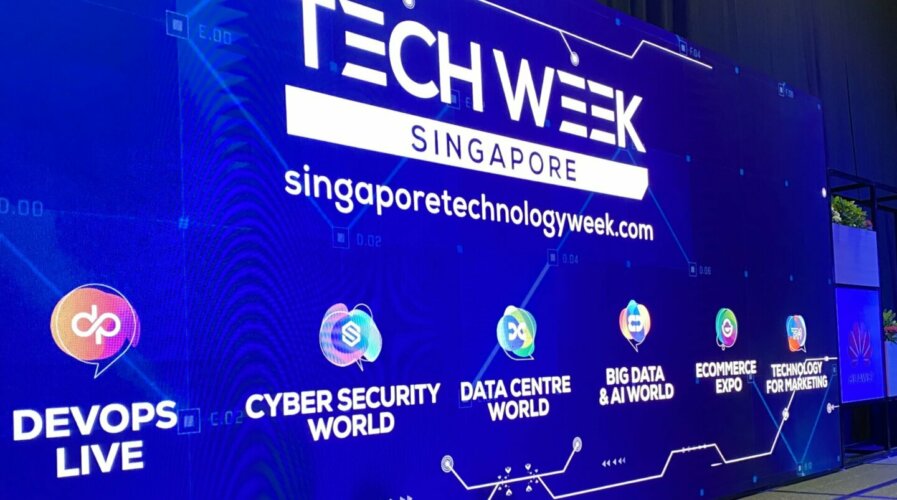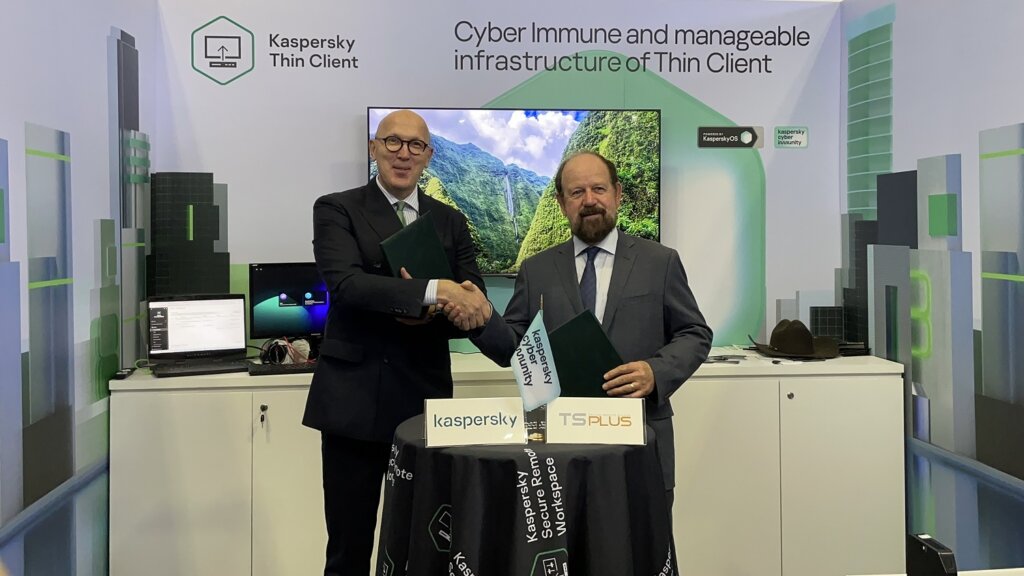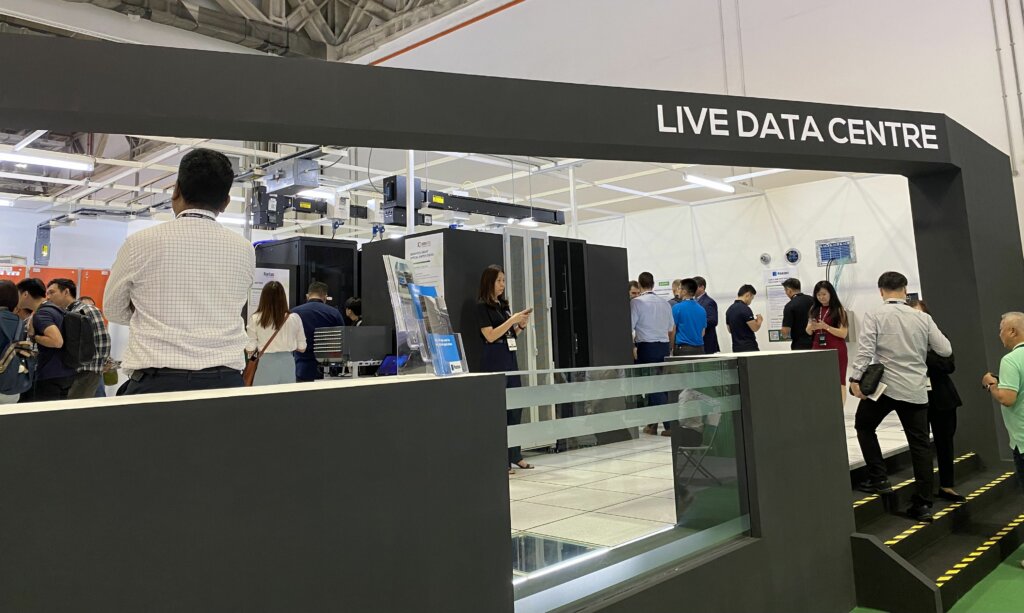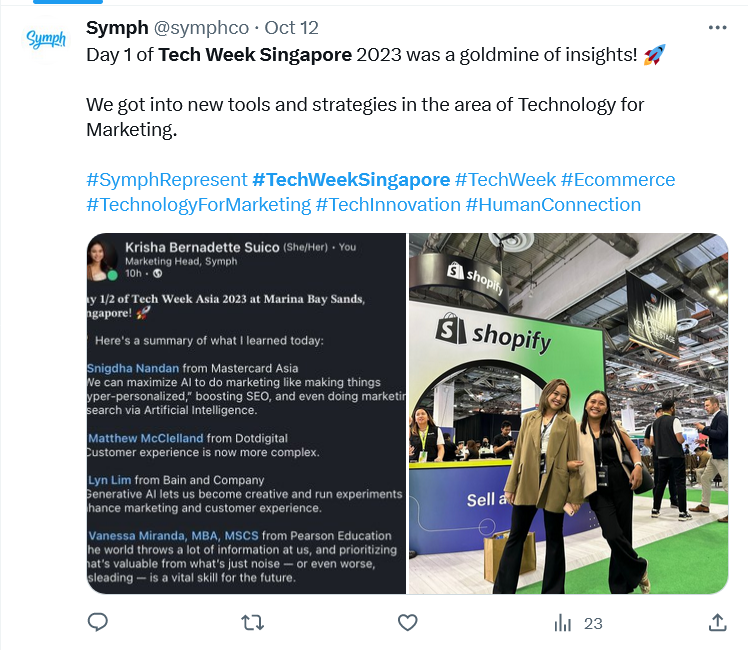
It was all about AI and its important role in impacting our daily lives.
Tech Week Singapore 2023: AI dominated tech discussions
- Tech Week Singapore 2023 became a hub for discussions on the transformative power of AI.
- As businesses rapidly adopt AI, discussions around its ethical implications and cybersecurity concerns intensified.
- Particular partnerships thrilled the event with their potential for data center cooling strategies.
It’s evident that 2023 has been dominated by AI advancements, with fresh breakthroughs emerging daily. The swift mainstreaming of AI is fueling its adoption across various sectors, as numerous businesses infuse this growing technology into their offerings.
Yet, the emerging AI landscape introduces challenges like cybersecurity, sustainability, and ethical dilemmas. The debate over AI’s pros and cons took center stage at Tech Week Singapore, Asia’s premier tech event by CloserStill Media. Over 600 tech innovators, top businesses, and influential figures gathered to delve into the intricacies of AI.
AI taking center stage to transform businesses and industries
At the event, Dr Aik Beng Ng, the Regional Manager for Nvidia AI Technology Centre, said that 2022 marked the global recognition of ChatGPT, signifying a transformative period for generative AI for many.
“We are just beginning to realize the true potential of AI where it meets the physical world. Currently the AI experience is very much digital. The next generation of AI is where AI meets the full extent of every industry out there, such as transportation, manufacturing, and more,” he continued.
However, AI’s advantages come paired with significant threats. Dr Magda Chelly, co-founder of Responsible Cyber, warned that while AI can elevate cyber-capabilities, it can also intensify cyber-risks. Its widespread use can magnify vulnerabilities, potentially triggering cascading effects in the wake of cyberattacks or data breaches, which could potentially destabilize broader supply chains and systems.
She remarked, “We also see an unparalleled opportunity for AI to bolster our cyberdefenses, especially when incorporated into data analysis and process optimization. By embracing AI in cybersecurity and third-party risk management strategies, businesses gain a clearer visibility into the cascading risks in their ecosystems. It’s crucial to understand that AI doesn’t merely represent the threat horizon but is an essential ally in navigating it.”
The ethical and cybersecurity dilemmas of AI in 2023
Speaking of cybersecurity, at the Cyber Security World Asia segment of Tech Week Singapore 2023, Singaporean startup, Responsible Cyber, introduced IMMUNE X-TPRM. This avant-garde AI-driven platform does more than just track real-time threats; it predicts risk trajectories, keeps businesses well-prepared against breaches, and optimizes operations with smart automation.
Additionally, Kaspersky partnered with TSplus, a remote access solution provider, inking a Memorandum of Understanding (MoU) at Cyber Security World Asia to develop cyber-immune virtual desktop access tools collaboratively.
The MoU outlines joint efforts to refine their offerings. Together, they’ll identify market demands for cyber-immune endpoints within their shared product verticals and strategize on meeting these needs globally. Kaspersky and TSplus aim to showcase their combined achievements to business, government, and academic circles, thereby heightening interest and demand for their cyber-immune solutions.
Under this partnership, Kaspersky will contribute its KasperskyOS and associated cyber-immune software. Conversely, TSplus will supply Remote Desktop, application delivery, and RDP cybershield services for businesses. This alliance also allows them to engage in promotional activities jointly.
Reflecting on the MoU, Andrey Suvorov, head of KasperskyOS business, observed that the dynamic work landscape has led to a growing global demand for remote desktop solutions.

Kaspersky partnered with TSplus, inking a MoU at Cyber Security World Asia to develop cyber-immune virtual desktop access tools collaboratively. (Source – Kaspersky)
“We develop these kinds of solutions based on the KasperskyOS operating system,” he continued. “We believe Kaspersky Thin Client has great potential, and our partnership with TSplus reinforces this belief. It is based on our first and agile joint efforts we started in April 2023, and I am personally satisfied with the enthusiasm and profound quality of our cooperation.”
The agreement between the two companies spans three years, offering the possibility of an extension beyond this timeframe.
As the rush towards AI intensifies, it’s crucial to focus on data centers, which are the backbone of the increased demand for computing capabilities. The concentration of server computers needed for AI produces substantial heat and uses a vast quantity of water for cooling. That leads to concerns regarding energy efficiency and environmental sustainability. Countries like Singapore are prioritizing sustainable development, and introducing standards for data centers in tropical environments.
Delving deeper into the sustainability standards, Singapore’s Infocomm Media Development Authority (IMDA) is spearheading efforts to position the country as the epicenter for digital sustainability in the region. It’s fostering international collaborations that aim to shape a greener digital future.
IMDA is partnering with influential companies like IBM and Microsoft to support this mission further. Singapore takes pride in being the inaugural nation to align with the Green Software Foundation and European Green Digital Coalition. The goal is to share practical methods and advocate for the adoption of eco-friendly software, equipping software developers with green techniques and promoting carbon-conscious solutions.
Meeting green standards in a tropical region
One company making strides in this area is Schneider Electric Singapore. The company has unveiled its primary plans to monitor and ensure sustainability in data centers, and has committed SG$1.2 million to partner with the Sustainable Tropical Data Centre Testbed in Singapore, highlighted in its keynote presentation at Data Centre World Asia.
This testbed is groundbreaking for tropical regions, striving to create environmentally friendly cooling techniques that will allow tropical data centers to function at their best. Supported by the National Research Foundation, Singapore and situated at the National University of Singapore, the initiative involves a collaboration of industry stakeholders. Research at the STDCT is jointly overseen by the National University of Singapore and the Nanyang Technological University.
Data centers in tropical countries like Singapore traditionally demand massive power for optimal environmental control, leading to exorbitant expenses and carbon output. The testbed aspires to produce and champion eco-friendly cooling solutions for these data centers. The overarching goal of STDCT is to derive operating protocols and influence industry standards from their novel technological discoveries.

Building a greener environment to help data centers in the region operate optimally.
As part of the partnership, Schneider Electric will contribute its technologies like Uninterruptible Power Supply (UPS) systems, fan walls, busways, and Smart Low-Voltage (LV). Moreover, the testbed will incorporate Schneider Electric’s EcoStruxure Building Operations, an advanced building management tool. This solution, part of Schneider Electric’s offerings, includes an energy management feature that lets the team oversee and optimize the testbed’s efficiency.

AI in all its current forms was the talk of Tech Week.
Schneider Electric’s cluster president for Singapore and Brunei, Yoon Young Kim, highlighted the growing need for data centers in Asia’s burgeoning digital landscape. Cooling these infrastructures in the region’s climate is both monetarily and ecologically costly.
Associate Professor Lee Poh Seng, who heads the STDCT program, explained that the testbed is a revolutionary step, emphasizing its dedication to evolving the regional data center sector. He emphasized that collaborating with dedicated partners like Schneider Electric ensures the STDCT will be a hallmark of innovation, benefiting the region and the global data center landscape.
Deciphering the AI narrative of 2023
2023 stands as the year when AI became a mainstream topic. Wrapping up the event, there was a widespread realization that this AI era brings more uncertainties than clarifications. Andy Kiwanuka, managing director for Asia Pacific at CloserStill Media, posed critical questions for leaders venturing into this AI-dominated era, and pondered the varying strategies for different business scales.
“How can leaders separate tactics from media noise, and what are the priorities for business leaders entering this new AI-enabled future? What strategies will make sense to a small-medium enterprise versus a multinational corporation?” he asked.
READ MORE
- 3 Steps to Successfully Automate Copilot for Microsoft 365 Implementation
- Trustworthy AI – the Promise of Enterprise-Friendly Generative Machine Learning with Dell and NVIDIA
- Strategies for Democratizing GenAI
- The criticality of endpoint management in cybersecurity and operations
- Ethical AI: The renewed importance of safeguarding data and customer privacy in Generative AI applications




